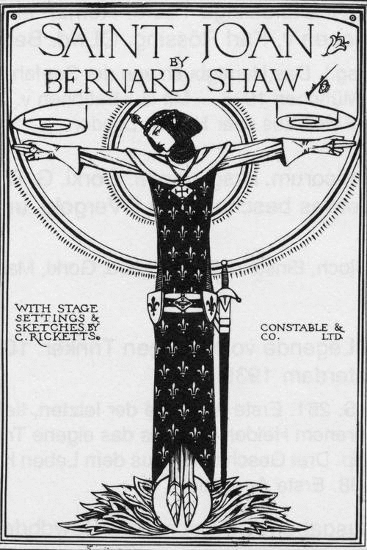Saint Joan (play)
| Saint Joan | |
|---|---|

Constable & Co., Ltd. cover, 1924
|
|
| Written by | George Bernard Shaw |
| Date premiered | 28 December 1923 |
| Place premiered |
Garrick Theatre Manhattan, New York City |
| Original language | English |
| Genre | Drama |
| Setting | 15th century France |
Saint Joan is a play by George Bernard Shaw about 15th Century French military figure Joan of Arc. Premiering in 1923, three years after her canonization by the Roman Catholic Church, the play dramatises what is known of her life based on the substantial records of her trial. Shaw studied the transcripts and decided that the concerned people acted in good faith according to their beliefs. He wrote in his preface to the play:
There are no villains in the piece. Crime, like disease, is not interesting: it is something to be done away with by general consent, and that is all [there is] about it. It is what men do at their best, with good intentions, and what normal men and women find that they must and will do in spite of their intentions, that really concern us.
Michael Holroyd has characterised the play as "a tragedy without villains" and also as Shaw's "only tragedy". John Fielden has discussed further the appropriateness of characterising Saint Joan as a tragedy.
The text of the published play includes a long Preface by Shaw.
Shaw characterised Saint Joan as "A Chronicle Play in 6 Scenes and an Epilogue". Joan, a simple peasant girl, claims to experience visions of Saint Margaret, Saint Catherine, and the archangel Michael, which she says were sent by God to guide her conduct.
Scene 1 (23 February 1429): Robert de Baudricourt complains about the inability of the hens on his farm to produce eggs. Joan claims that her voices are telling her to lift the siege of Orléans, and to allow her several of his men for this purpose. Joan also says that she will crown the Dauphin in Reims Cathedral. De Baudricourt ridicules Joan, but his Steward feels inspired by her words. De Baudricourt eventually begins to feel the same sense of inspiration, and gives his consent to Joan. The Steward enters at the end of the scene to exclaim that the hens have begun to lay eggs again. De Baudricourt interprets this as a sign from God of Joan's divine inspiration.
...
Wikipedia
